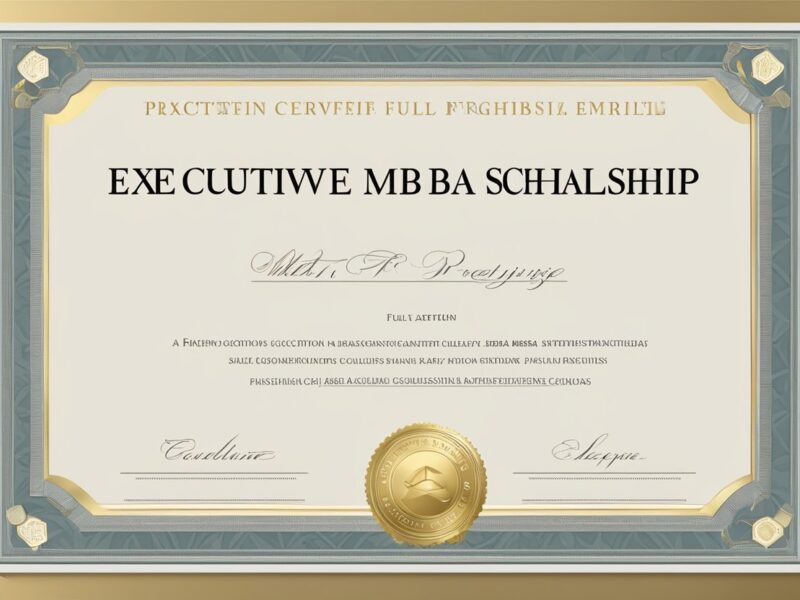Are you considering pursuing an Executive MBA but worried about the cost? A full scholarship may be the solution you need. Executive MBA programs are designed for experienced professionals who want to advance their careers and develop their leadership skills. However, the high cost of these programs can be a barrier for many.
Fortunately, some universities and organizations offer full scholarships for Executive MBA programs. These scholarships cover tuition, fees, and sometimes even living expenses. They are highly competitive and require a strong application, but they can provide a valuable opportunity for those who may not otherwise be able to afford an Executive MBA. In this article, we will explore the benefits of an Executive MBA full scholarship and provide tips on how to apply successfully.
Understanding Executive MBA Full Scholarships
If you are considering an Executive MBA program, you may be wondering how to finance your education. Fortunately, there are many full scholarship opportunities available for Executive MBA students. In this section, we will discuss the eligibility criteria, types of scholarships, and application process for Executive MBA full scholarships.
Eligibility Criteria
To be eligible for an Executive MBA full scholarship, you must meet certain criteria set by the scholarship provider. These criteria may vary depending on the scholarship, but generally, you must have:
- A strong academic record
- Relevant work experience
- Leadership potential
- Financial need (in some cases)
In addition, you may be required to submit essays, letters of recommendation, and other application materials to demonstrate your qualifications.
Types of Scholarships
There are several types of Executive MBA full scholarships available, including:
- Merit-based scholarships: These scholarships are awarded based on academic achievement, professional experience, and leadership potential.
- Diversity scholarships: These scholarships are awarded to students from underrepresented backgrounds, such as women, minorities, and international students.
- Need-based scholarships: These scholarships are awarded based on financial need.
Some scholarships may combine these criteria, so it’s important to read the scholarship requirements carefully.
Application Process
The application process for Executive MBA full scholarships varies depending on the scholarship provider. However, most scholarships require the following:
- Completed application form
- Essays or personal statement
- Letters of recommendation
- Transcripts
- Resume or CV
It’s important to submit your application materials on time and to follow all instructions carefully. In addition, you may be required to attend an interview or complete additional application requirements.
In conclusion, Executive MBA full scholarships can be a great way to finance your education and achieve your career goals. By understanding the eligibility criteria, types of scholarships, and application process, you can increase your chances of receiving a full scholarship and pursuing your Executive MBA with confidence.
Top Institutions Offering Full Scholarships
If you are considering pursuing an Executive MBA, you may be wondering how to finance your education. Fortunately, there are several top institutions that offer full scholarships for qualified candidates. In this section, we will highlight some of the best domestic and international opportunities for Executive MBA full scholarships.
Domestic Opportunities
- Wharton School of the University of Pennsylvania: Wharton offers several full-tuition scholarships for Executive MBA candidates. These scholarships are awarded based on merit and need, and cover the full cost of tuition for the program.
- Kellogg School of Management at Northwestern University: Kellogg offers a number of full-tuition scholarships for Executive MBA students. These scholarships are awarded based on merit and need, and cover the full cost of tuition for the program.
- Booth School of Business at the University of Chicago: Booth offers several full-tuition scholarships for Executive MBA candidates. These scholarships are awarded based on merit and need, and cover the full cost of tuition for the program.
International Opportunities
- INSEAD: INSEAD offers several full-tuition scholarships for Executive MBA candidates. These scholarships are awarded based on merit and need, and cover the full cost of tuition for the program. INSEAD also offers a number of partial scholarships for Executive MBA students.
- London Business School: London Business School offers a number of full-tuition scholarships for Executive MBA students. These scholarships are awarded based on merit and need, and cover the full cost of tuition for the program.
- IE Business School: IE Business School offers several full-tuition scholarships for Executive MBA candidates. These scholarships are awarded based on merit and need, and cover the full cost of tuition for the program. IE Business School also offers a number of partial scholarships for Executive MBA students.
In conclusion, if you are interested in pursuing an Executive MBA but are concerned about the cost, consider applying for a full scholarship. There are many top institutions that offer these scholarships to qualified candidates.
Maximizing Your Chances of Success
If you are interested in pursuing an Executive MBA with a full scholarship, there are several things you can do to maximize your chances of success. Here are a few tips to help you build a strong profile, network effectively, and secure strong recommendations.
Building a Strong Profile
One of the most important things you can do to increase your chances of receiving a full scholarship for an Executive MBA program is to build a strong profile. This means demonstrating your leadership potential, academic achievements, and professional accomplishments.
To build a strong profile, you should focus on the following:
- Demonstrating leadership potential: Highlight your leadership experience and skills, including any experience managing teams, leading projects, or serving in leadership roles in your community.
- Showcasing academic achievements: Emphasize your academic achievements, including your GPA, any academic awards or honors, and any relevant coursework or certifications.
- Highlighting professional accomplishments: Showcase your professional accomplishments, including any promotions, awards, or recognition you have received in your field.
Networking and Recommendations
Networking and recommendations can also play a key role in securing a full scholarship for an Executive MBA program. Here are a few tips to help you network effectively and secure strong recommendations:
- Build a strong network: Attend networking events, join professional organizations, and connect with alumni of the Executive MBA program you are interested in. This can help you build relationships with people who may be able to provide recommendations or offer support for your scholarship application.
- Seek strong recommendations: Reach out to people who can provide strong recommendations for your scholarship application, such as current or former supervisors, colleagues, or professors. Be sure to provide them with a clear understanding of your goals and why you are interested in pursuing an Executive MBA.
- Follow up: After you have secured recommendations, be sure to follow up with your recommenders to thank them for their support and keep them updated on your progress.
By following these tips, you can increase your chances of success in securing a full scholarship for an Executive MBA program.
Post-Scholarship Commitments
After being awarded a full scholarship for an Executive MBA program, you will likely be required to fulfill certain commitments post-graduation. These commitments are put in place to ensure that you are able to give back to the community and continue to contribute to the success of the program.
Service Requirements
One common commitment that is required of scholarship recipients is a certain amount of community service or volunteer work. This may include participating in mentorship programs, serving on non-profit boards, or volunteering with local organizations. The specific requirements may vary depending on the program, but it is important to be aware of these commitments before accepting the scholarship.
Alumni Contributions
In addition to community service, many scholarship recipients are also expected to contribute to the program as alumni. This may include attending events, serving as a mentor to current students, or making financial contributions to the program. By staying involved with the program, you can help ensure its continued success and support future scholarship recipients.
Overall, it is important to carefully consider the post-scholarship commitments before accepting a full scholarship for an Executive MBA program. While these commitments may seem daunting, they are designed to help you give back to the community and continue to contribute to the success of the program.










